广州英语沪教牛津版八年级上册Unit2讲义和练习电子教案
- 格式:docx
- 大小:47.39 KB
- 文档页数:16
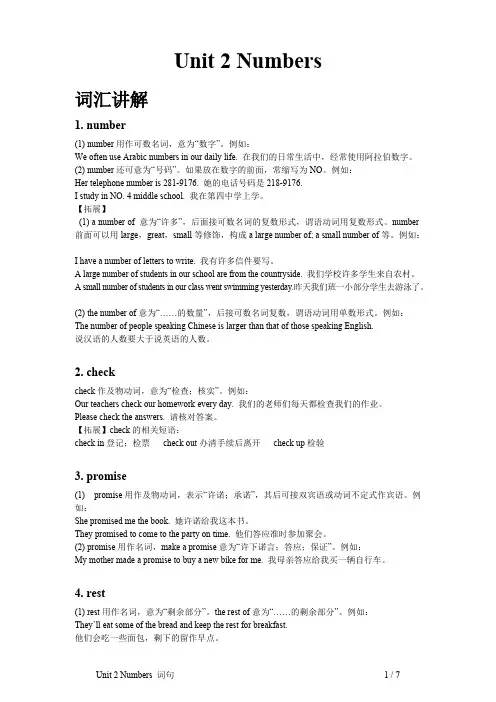
Unit 2 Numbers词汇讲解1. number(1) number用作可数名词,意为“数字”。
例如:We often use Arabic numbers in our daily life. 在我们的日常生活中,经常使用阿拉伯数字。
(2) number还可意为“号码”。
如果放在数字的前面,常缩写为NO。
例如:Her telephone number is 281-9176. 她的电话号码是218-9176.I study in NO. 4 middle school. 我在第四中学上学。
【拓展】(1) a number of 意为“许多”,后面接可数名词的复数形式,谓语动词用复数形式。
number前面可以用large,great,small等修饰,构成a large number of; a small number of等。
例如:I have a number of letters to write. 我有许多信件要写。
A large number of students in our school are from the countryside. 我们学校许多学生来自农村。
A small number of students in our class went swimming yesterday.昨天我们班一小部分学生去游泳了。
(2) the number of意为“……的数量”,后接可数名词复数,谓语动词用单数形式。
例如:The number of people speaking Chinese is larger than that of those speaking English.说汉语的人数要大于说英语的人数。
2. checkcheck作及物动词,意为“检查;核实”。
例如:Our teachers check our homework every day. 我们的老师们每天都检查我们的作业。
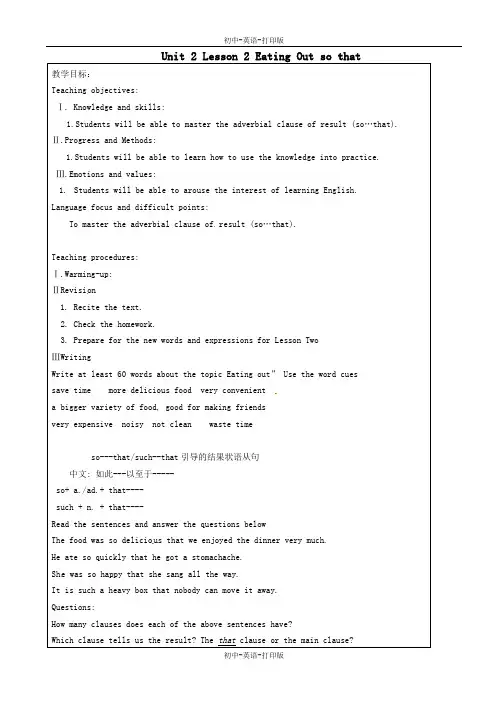
教学目标:Teaching objectives:Ⅰ. Knowledge and skills:1.Students will be able to master the adverbial clause of result (so…that). Ⅱ.Progress and Methods:1.Students will be able to learn how to use the knowledge into practice. Ⅲ.Emotions and values:1.Students will be able to arouse the interest of learning English. Language focus and difficult points:To master the adverbial clause of result (so…that).Teaching procedures:Ⅰ.Warming-up:ⅡRevisi on1. Recite the text.2. Check the homework.3. Prepare for the new words and expressions for Lesson TwoⅢWritingWrite at least 60 words about the topic Eating out” Use t he word cuessave time more delicious food very convenienta bigger variety of food, good for making friendsvery expensive noisy not clean waste timeso---that/such--that引导的结果状语从句中文: 如此---以至于-----so+ a./ad.+ that----such + n. + that----Read the sentences and answer the questions belowThe food was so delicio us that we enjoyed the dinner very much.He ate so quickly that he got a stomachache.She was so happy that she sang all the way.It is such a heavy box that nobody can move it away.Questions:How many clauses does each of the above sentences have?Which clause tells us the result? The that clause or the main clause?What kink of word can we use after so? An adject ive or an adverb?Exercises:1. The service of that restaurant was very good. I would call again.2. The waiter was very nice. Mr. Smith left him a 20 per cent tip.3. Helen was very kind to Zhang Jun. She helped him a lot during his stay in London.4. The roast chicken was very tasty. I liked it very much.5. Restaurant food is very expensive. Some people pack their lunch to work every day.6. The customers were very pleased with the service. They left very big tips.7. The Chinese painting is very beautiful. Everyone likes it.8. Polly’s lecture was very interesting. It attracted a large audience.9. The girl is so clever that she can work out the problem herself. (enough t o)10. The man was so tired that he couldn’t walk any farther. (too--to)11. The steak was so salty that I could hardly eat it .(too--to)12. Sally is so tall that she can reach the lights.(enough to)13. The porter looks very strong. He can easily carry the heavy box. (enough to)14. The restaurant is so small that it can’t hold twenty customers. (too--to)Ⅲ.Post-task:Homework1. Prepare for Writing。
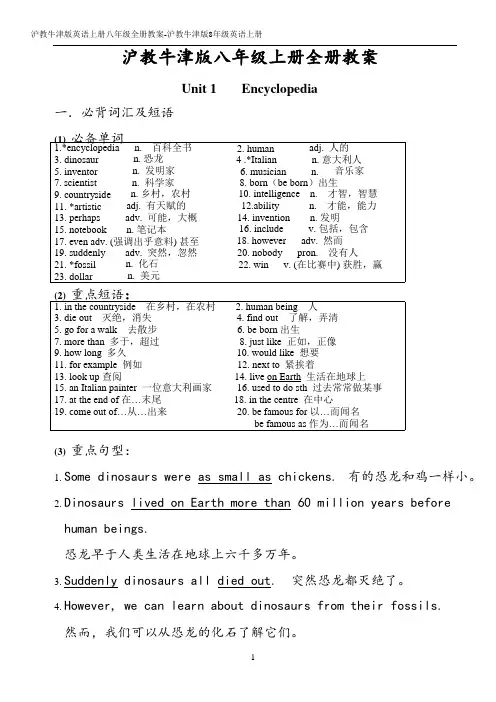
20. nobody pron. 没有人 22. win v. (在比赛中) 获胜,赢 adv. 突然,忽然 n. 化石 n. 美元 19. suddenly21. *fossil23. dollar10. intelligence n. 才智,智慧 12.ability n. 才能,能力 14. invention n. 发明 16. include v. 包括,包含 18. however adv. 然而 17. even adv. (强调出乎意料) 甚至8. born (be born )出生 音乐家 n. adj. 人的 n. 意大利人 2. human 4 .*Italian 6. musician n. 百科全书n. 恐龙 n. 发明家 n. 科学家 n. 乡村,农村 adj. 有天赋的 adv. 可能,大概 n. 笔记本 1.*encyclopedia 3. dinosaur5. inventor7. scientist9. countryside11. *artistic13. perhaps15. notebook沪教牛津版八年级上册全册教案Unit 1Encyclopedia 一.必背词汇及短语(1) 必备单词(3) 重点句型:1. Some dinosaurs were as small as chickens. 有的恐龙和鸡一样小。
2. Dinosaurs lived on Earth more than 60 million years before human beings.恐龙早于人类生活在地球上六千多万年。
3. Suddenly dinosaurs all died out. 突然恐龙都灭绝了。
4. However, we can learn about dinosaurs from their fossils. 然而,我们可以从恐龙的化石了解它们。
5.Nobody knows why. 没有人知道其中的原因。
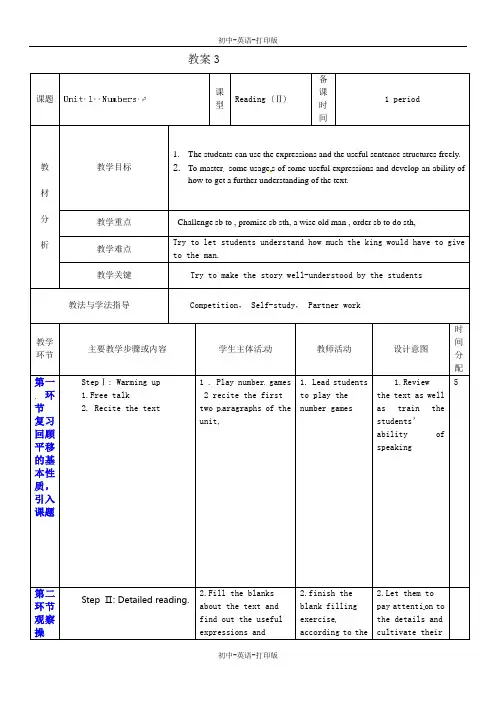
教案3课题课型Reading (Ⅱ)备课时间1 period教材分析教学目标1.The students can use the expressions and the useful sentence structures freely.2.To master some usage s of some useful expressions and develop an ability ofhow to get a further understanding of the text.教学重点Challenge sb to , promise sb sth, a wise old man , order sb to do sth,教学难点Try to let students understand how much the king would have to giveto the man.教学关键Try to make the story well-understood by the students教法与学法指导Competition, Self-study, Partner work教学环节主要教学步骤或内容学生主体活动教师活动设计意图时间分配第一环节复习回顾平移的基本性质,引入课题StepⅠ: Warming up1.Free talk2. Recite the text1 . Play number games2 recite the firsttwo p aragraphs of theunit,1. Lead studentsto play thenumber games1.Reviewthe text as wellas train thestudents’ability ofspeaking5第二环节观察操Step Ⅱ: Detailed reading. 2.Fill the blanksabout the text andfind out the usefulexpressions and2.finish theblank fillingexerciseaccording to the2.Let them topay attenti on tothe details andcultivate their作、探索归纳平移的作法StepⅢ:Important phrases and Sentence structureslearning. structures in the textlike :India , wise, prize,grain , double , collect,realized, square3. Make sentences withthese importantpoints in the text andtake notes of theexplanati ons of theimportant points:challenge him to a game,order his men to ,realize the problem ,have enough rice to ,a long time ago , andso on , copy downtext , and missthe importantphrases anddifficult pointin the blankfillingexercise3. Show somepictures by PPT,and expl ain theusage of theimportantphrases and themain lan guagepoints ,thebasicstructures ofthe text. Thenprepare severalpaper whichcontain thesentence madewith theimportantphrasesability ofthinking.3.To develop thestudents’ability ofcooperation andto make everysu re studenttake part in thework.第三环节课堂练习StepVI: Mor e practice 4. Use the right formsof the expressions tofinish the sentences.5. Translate theChinese sentencesinto English by usingthe important phrasesin the text4.Give them anexample to dothe exercise.5. work in groupto check theanswers.4. to consolatethe usage of thekey points ofthe text5. let studentsuse the usefulexpressionsthey learned第四环节课时小结StepⅥ: sum up7.write down andremember theimportant points ofthis class.6.Show a PPT andsum up the mainpoints of thetext and leadstudents to readit.第五环节课后作业Step V: Homework 1. remember theimportant points andprepare for thedictation2. Make sentences withthe important pointsand structureslearned in this class课堂教学流程Free talk→ Reciting→ Get the important points and play games →Useful-structure→ Exercise。
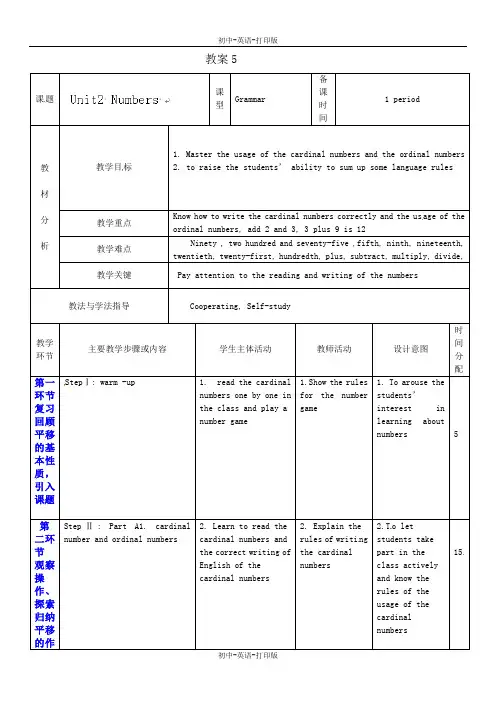
教案5课题课型Grammar备课时间1 period教材分析教学目标1. Master the usage of the cardinal numbers and the ordinal numbers2. to raise the students’ ability to sum up some language rules教学重点Know how to write the cardinal numbers correctly and the us age of theordinal numbers, add 2 and 3, 3 plus 9 is 12教学难点Ninety , two hundred and seventy-five ,fifth, ninth, nineteenth,twentieth, twenty-first, hundredth, plus, subtract, multiply, divide, 教学关键 Pay attention to the reading and writing of the numbers教法与学法指导Cooperating, Self-study教学环节主要教学步骤或内容学生主体活动教师活动设计意图时间分配第一环节复习回顾平移的基本性质,引入课题StepⅠ: warm -up 1. read the cardinalnumbers one by one inthe class and play anumber game1.Show the rulesfor the numbergame1. To arouse thestudents’interest inlearning aboutnumbers 5第二环节观察操作、探索归纳平移的作StepⅡ: Part A1. cardinalnumber and ordinal numbers2. Learn to read thecardinal numbers andthe correct writing ofEnglish of thecardinal numbers2. Explain therules of writi ngthe cardinalnumbers2.T o letstudents takepart in theclass activelyand know therules of theusage of thecardinalnumbers15法StepⅢ: Part A2 Step IV : Part B 3. Learn to change thecardinal numbers tothe ordinal numbersand pay attention tosome special oneslike : fifth , ninth,twelfth ,twentieth,h undredth4.Learn theinstructions aboutnumbers ,know how toexpress add,subtract, multiply,divide ,3. sum up therules about theusage of therules of theordinal numbersAnd explain theusage of theordinal numbersin our dailylife. and payattention to thedefinite wordthe in front ofthe ordinalnumbers4.Lead studentsto read thesentences andfinish theexercise inpai rs3.know moreabout the usageof the ordinalnumbers4. to learn theexpressions toshow add,subtract ,multiply,divide.第三环节课堂练习Step Step V: more practice 5.finish the exercisegiven by teacher andpractice the usage ofthe and with5. hand out thesheets and letstudents finishthe exercise init5.Toconsolidatewhat they havelearned in thisclass10第四环节课时小结StepⅥ:Sum up 6. Go over the rules ofcardinal numbers andthe ordinal numbers6. Give moreexercises toconsolidate thewriti ng of thecardi nal numberand theordinal number6.To makestudents have agood habit oftaking notes andhave a generalunderstandingof this class5第五环节课后作业Finish the exercise in the English paper.课堂教学流程Free talk→ Explain the writing of cardinal numbers→ the rules of changing the cardinal numbers into ordinal numbers→Exercise→Sum up效果评价与反思。
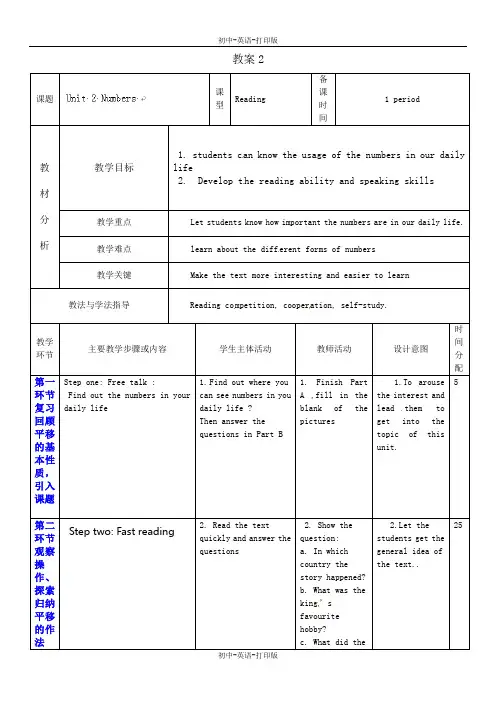
教案2课题课型Reading备课时间1 period教材分析教学目标1. students can know the usage of the numbers in our dailylife2. Develop the reading ability and speaking skills教学重点Let students know how important the numbers are in our daily life.教学难点learn about the diff erent forms of numbers教学关键Make the text more interesting and easier to learn教法与学法指导Reading co mpetition, cooperation, self-study.教学环节主要教学步骤或内容学生主体活动教师活动设计意图时间分配第一环节复习回顾平移的基本性质,引入课题Step one: Free talk :Find out the numbers in yourdaily life1.Find out where youcan see numbers in youdaily life ?Then answer thequestions in Part B1. Finish PartA ,fill in theblank of thepictures1.To arousethe interest andlead them toget into thetopic of thisunit.5第二环节观察操作、探索归纳平移的作法Step two: Fast reading 2. Read the textquickly and answer thequestions2. Show thequestion:a. In whichcountry thestory happened?b. What was theking’sfavouritehobby?c. What did the2.Let thestudents get thegeneral idea ofthe text..25Step three: while-reading. Reading comprehension. 3. Read the text indetails and finish theblank fillingexercise in a sheet,then check theanswers ,after that ,try to designquestions accordingto the text and askyour classmates toanswer it .Then let students havea try to count how muchrice the man couldget?4. Talk in group : Canyou tell someinteresting storiesabout numbersman want if hewon the game?d.Who win thegame?e. How much ricedid the man winat last?3. hand out thesheet and designthe blankaccording to theimportantinformation.Then check theanswers withstudents4. share someinterestingstories aboutnumb ers withstudents3.To make themget familiarwith the detailsof the text andtrain theirability ofreading4.train thestudentsspeakingability andcooperationability.Step four: Discussion第三环节课堂练习Step five: exercise 5.Finish theexercise i n Part Cand D5.Help them tofind the detailsin the text.5. To train thestudents’readingability .5第四环节课时小结step Six: Sum up 6 Sum up :Numbers arevery important in ourdaily life. We shoulduse it carefully .6. Show a PPT tosum up : numberscan be used toshow time, tell usthe amount ofthings , and canindentify therooms etc.6. Prepare forthe writing5第五环节课后作业 Homework 1. Read the textfluently2. write a passageabout the usage ofnumbers in our dailylifeHand out asheet whichcontain therequest ofwriting thepassageStrengthen thecomprehensionof the text.课堂教学流程Free talk --- Preparation ---Reading competition ----- Discussion—exercise—sum up--Homework .效果评价与反思。
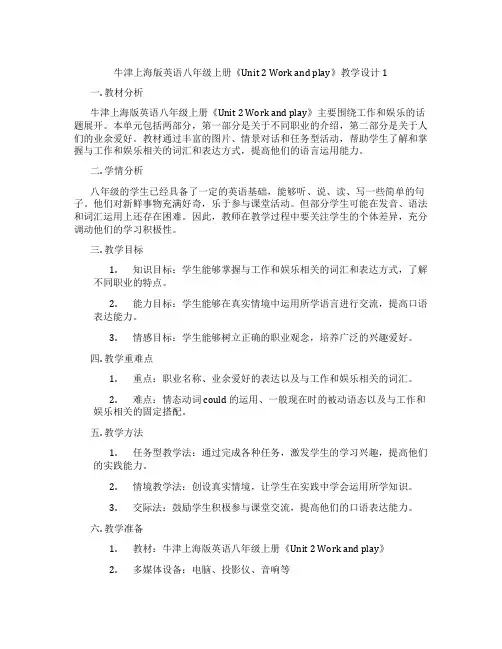
牛津上海版英语八年级上册《Unit 2 Work and play》教学设计1一. 教材分析牛津上海版英语八年级上册《Unit 2 Work and play》主要围绕工作和娱乐的话题展开。
本单元包括两部分,第一部分是关于不同职业的介绍,第二部分是关于人们的业余爱好。
教材通过丰富的图片、情景对话和任务型活动,帮助学生了解和掌握与工作和娱乐相关的词汇和表达方式,提高他们的语言运用能力。
二. 学情分析八年级的学生已经具备了一定的英语基础,能够听、说、读、写一些简单的句子。
他们对新鲜事物充满好奇,乐于参与课堂活动。
但部分学生可能在发音、语法和词汇运用上还存在困难。
因此,教师在教学过程中要关注学生的个体差异,充分调动他们的学习积极性。
三. 教学目标1.知识目标:学生能够掌握与工作和娱乐相关的词汇和表达方式,了解不同职业的特点。
2.能力目标:学生能够在真实情境中运用所学语言进行交流,提高口语表达能力。
3.情感目标:学生能够树立正确的职业观念,培养广泛的兴趣爱好。
四. 教学重难点1.重点:职业名称、业余爱好的表达以及与工作和娱乐相关的词汇。
2.难点:情态动词 could 的运用、一般现在时的被动语态以及与工作和娱乐相关的固定搭配。
五. 教学方法1.任务型教学法:通过完成各种任务,激发学生的学习兴趣,提高他们的实践能力。
2.情境教学法:创设真实情境,让学生在实践中学会运用所学知识。
3.交际法:鼓励学生积极参与课堂交流,提高他们的口语表达能力。
六. 教学准备1.教材:牛津上海版英语八年级上册《Unit 2 Work and play》2.多媒体设备:电脑、投影仪、音响等3.教学素材:图片、视频、练习题等4.板书设计:职业名称、业余爱好、关键词汇等七. 教学过程1.导入(5分钟)利用图片和视频展示不同职业的特点,引导学生谈论各自父母的职业,激发学生的学习兴趣。
2.呈现(10分钟)教师通过情境对话呈现本节课的主要词汇和表达方式,让学生跟读并模仿。
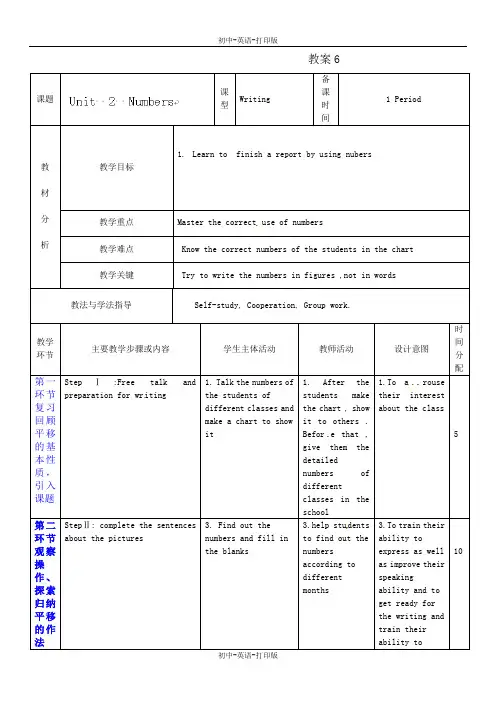
教案6课题课型Writing备课时间1 Period教材分析教学目标1.Learn to finish a report by using nubers教学重点Master the correct use of numbers教学难点 Know the correct numbers of the students in the chart 教学关键 Try to write the numbers in figures ,not in words教法与学法指导Self-study, Cooperation, Group work.教学环节主要教学步骤或内容学生主体活动教师活动设计意图时间分配第一环节复习回顾平移的基本性质,引入课题StepⅠ:Free talk andpreparation for wr iting1. Talk the numbers ofthe students ofdifferent classes andmake a chart to showit1. After thestudents makethe chart , showit to others .Befor e that ,give them thedetailednumbers ofdifferentclasses in theschool1.To a rousetheir interestabout the class5第二环节观察操作、探索归纳平移的作法StepⅡ: complete the sentencesabout the pictures3. Find out thenumbers and fill inthe blanks3.help stu dentsto find out thenumbersaccording todifferentmonths3.To train theirability toexpress as wellas improve theirspeakingability and toget ready forthe writing andtrain theirability to10cooperate.第三环节课堂练习Step III: WritingStep IV: Check the passage 4.Before writing ,find out the numbersaccording to theyears, and begin towrite the passage ,pay attention to thetenses4.Show thenumbers and thematched yearson PPT, thenremindstudents to payattention totheirhandwritingand check them istakesstudents make4.To train thestudents’writing ability.15第四环节课时小结Step five Sum upHow to organize the writing.5. Sum up the usage ofnumbers in our dailylife.5.List thebeautifulsentences theywrite in thepassages5.Let them getfamiliar withthe writ ing.5第五环节课后作业1. Recite the passage which given as a sample .课堂教Free talk and preparation →Fill in the blank →write a pa ssage—Check the writhing. 学流程效果评价与反思。
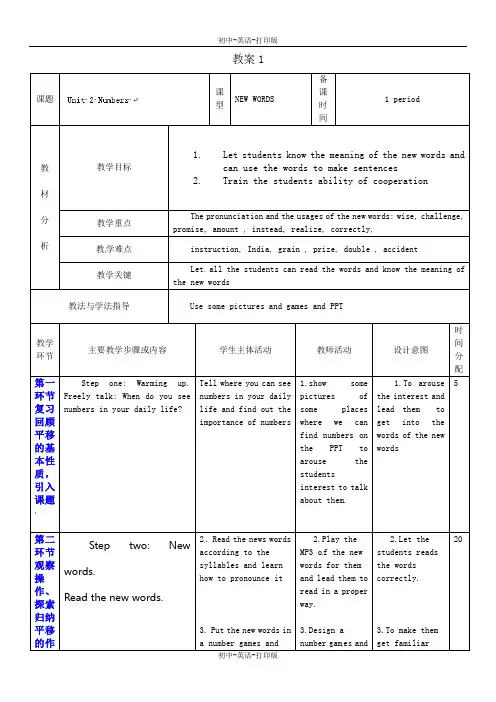
教案1课题课型NEW WORDS备课时间1 period教材分析教学目标1.Let students know the meaning of the new words andcan use the words to make sentences2.Train the students ability of cooperation教学重点The pronunciation and the usages of the new words: wise, challenge,promise, amount , instead, realize, correctly,教学难点instruction, India, grain , prize, double , accident教学关键Let all the students can read the words and know the meaning ofthe new words教法与学法指导Use some pictures and games and PPT教学环节主要教学步骤或内容学生主体活动教师活动设计意图时间分配第一环节复习回顾平移的基本性质,引入课题Step one: Warming up.Freely talk: When do you seenumbers in your daily life?Tell where you can seenumbers in your dailylife and find out theimportance of numbers1.show somepictures ofsome placeswhere we canfind numbers onthe PPT toarouse thestudentsinterest to talkabout them.1.To arousethe interest andlead them toget into thewords of the newwords5第二环节观察操作、探索归纳平移的作Step two: Newwords.Read the new words.2. Read the news wordsaccording to thesyllables and learnhow to pronounce it3. Put the new words ina number games and2.Play theMP3 o f the newwords for themand lead them toread in a properway.3.Design anumber gam es and2.Let thestudents readsthe wordscorrectly.3.To make themget familiar20法Step three: Play numbergames to remember thenew wordsStep four: Key wordslearning. play games .try to remember thenew words as quicklyas you can, with thehelp of the groupleader, then checkwith each otherwhether you rememberthe words or not .4. Work in groups tolearn the usage of thekey words, helpful ,anywhere, finally,nothing , arrive at,lead sb to , fallasleep , get down, byoneself, wake up5. match the new wordsand the pictu res shownon the pptplay a numbergames to helpthe studentswhen they havetrouble inreading the newwords4.Show the PPTof the meaningof th e key wordsand let ss makemore sentenceswith th e newwords5. check the wordsand give themmarks for thegroupswith thepronunciationand the spellin gof the newwords.4. Train thestudents’ability tocooperate. Letthe students indifferent levescan take part inthe activity.5.Provie thechances tostudents to showthemselves andpractice thespeakingability.Step five: have a competition第三环节课堂练习Step six: exercise1. use the correct forms ofthe words to fil l in theblanks like :My mother doesn’t allow me____( go) out at night.6. Finish theexercise given onthe sheet.6.Collect themistakes in thestudents’exercise.6. to consulatethe usages ofthe new words10第四环节课时小结step SevenHow many words do youmaster?Write them down in yoursheet7. Remember the wordsyou learn and spellthem out7.Give them apiece of paperto write thewords.7.To de velop thestudents’ability of self–checking.5。
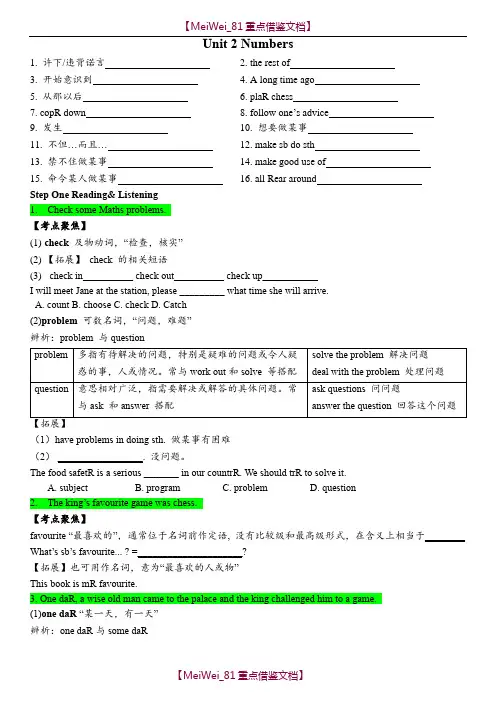
Unit 2 Numbers1. 许下/违背诺言_____________________2. the rest of_____________________3. 开始意识到_____________________4. A long time ago_____________________5. 从那以后_____________________6. plaR chess_____________________7. copR down_____________________ 8. follow one’s advice_____________________9. 发生_____________________ 10. 想要做某事_____________________11. 不但…而且…_____________________ 12. make sb do sth_____________________13. 禁不住做某事_____________________ 14. make good use of_____________________15. 命令某人做某事_____________________ 16. all Rear around_____________________Step One Reading& Listening1.Check some Maths problems.【考点聚焦】(1)check 及物动词,“检查,核实”(2)【拓展】check 的相关短语(3)check in__________ check out__________ check up___________I will meet Jane at the station, please _________ what time she will arrive.A. countB. chooseC. checkD. Catch(2)problem可数名词,“问题,难题”辨析:problem 与question(1)have problems in doing sth. 做某事有困难(2)_________________. 没问题。
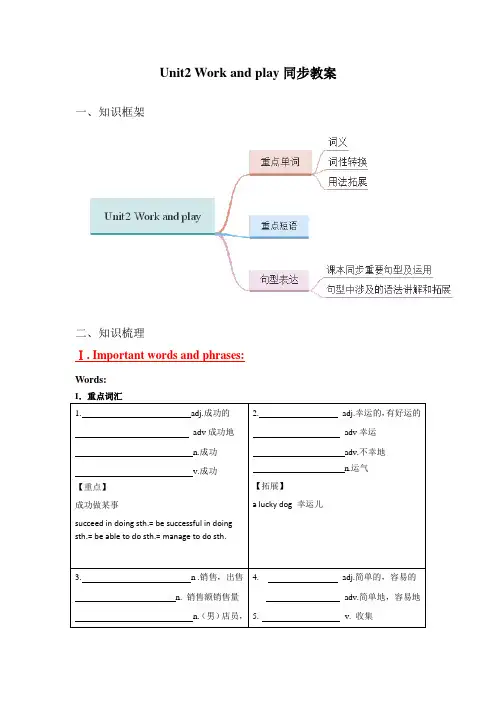
Unit2 Work and play同步教案一、知识框架二、知识梳理Ⅰ. Important words and phrases:Words:1. adj.成功的adv成功地n.成功v.成功【重点】成功做某事succeed in doing sth.= be successful in doing sth.= be able to do sth.= manage to do sth. 2. adj.幸运的,有好运的adv幸运adv.不幸地n.运气【拓展】a lucky dog 幸运儿3. n .销售,出售n. 销售额销售量n.(男)店员,4. adj.简单的,容易的adv.简单地,容易地5.v. 收集Ⅱ.重点词汇拓展12. drive v.驾驶;驱使drive sb. to sp. 开车送某人去某地drive sb. to do sth. 驱使某人去某地13.attend, join, join in, take part in辨析attend+会议attend the meeting/ classjoin+个人/团体join us, join the Party入党join in/ take part in+活动join in/ take part in activities 14.similar adj.相似的A be similar toB A和B相似A andB are similar inC A和B在C方面相似【形近词】familiar adj.熟悉的sb. be familiar with sth. 某人对某物熟悉的sth. be familiar to sb. 某物对于某人而言是熟悉的15.expect v.期待expect sth. expect (sb.) to do sth. 期待(某人)做某事look forward to doing sth. 期待做某事expectation n.期待16.popular adj.流行的be popular with/ among 在……中是流行的17.continue v.继续continue to do sth. 继续做某事(另一件事)continue doing sth. 继续做某事(原来的事)carry on= go on= continue 继续18.explain v.解释explain sth. to sb.向某人解释某事explanation cn.解释make an explanation to sb. 给某人一个解释19.energy n. 能量energetic adj.精力充沛的power n.权力powerful adj.强大的resource n.资源20.force n.(物理)力v. 强迫force sb. to do sth. 强迫某人做某事21.heat n.热,热度v. 加热【课堂小练】Ⅰ. 用所给单词的适当形式填空(错误率:掌握情况:)1. The bank refuses to accept _______________ for the mistake. (responsible)2. They were proud of their children’s _______________. (achieve)3. The children quickly got _______________ with staying indoors. (boring)4. It is _______________ to start a speech by thanking everybody for coming. (usually)5. Tom was still on his way to school, because he ______________ to catch the first bus. (failure)6. Tickets are on _______________ from the booking office. (sale)7. She is very clever and often do well in her _______________. (exam)8. The teacher _______________ the answers on the board yesterday. (write)Phrases:1. ride a motorcycle 骑摩托车2. play the piano 弹钢琴3. one of the top students in the city 市里优秀生之一4. have written several successful computer games已经写了几个成功的电脑游戏5. the manager of the company 公司的经理6. be responsible for sales 负责销售7. make phone calls to our clients on the way 在路上打电话给我们的客户8. some boring work 一些无聊的工作9. achieve A grades in all my subjects 各门学科都得A10. discuss the business over breakfast 早餐期间讨论公司业务11. fail an exam 考试不及格12. collect me from school 到学校接我13. attend Computer Club meetings 出席电脑俱乐部会议14. ask me to assist them 请我帮助他们15. continue doing sth. 继续做某事16. It is time for lessons. 上课的时间到了。
牛津上海版初二英语八年级上Unit2Morepractice教案Module 2 A day in the life of…WHIZ-KID WENDY (More practice)一、章节分析(一)综述本章节的目的是使学生继续熟悉和强化的对日常活动和常规行为的描述。
本课设计了三个任务来达到这一目标:1、通过表格所提供的线索,描述的一天生活。
注意某些词汇的含义:correct paper, gojogging, prepare lessons, give lessons。
2、制定暑假中的一天计划。
3、采访一位身边的人,收集从事某种职业的人日常工作情况。
学生应针对只要特点,事先设计调查问卷,事后写好采访报告,在全班面前汇报。
(二)教学方法采用合作学习法,根据任务不同,可以做pair work,也可以是小组活动,共同完成一项任务。
(四)重点和难点利用一般现在时表达日常习惯和行为。
二、教学设计(T eaching Designs)1. What is your job?2. What time do you get up every day?3. When do you go to work every day?4. How do you go to work?5. What do you do at work?6. What do you do in your spare time?7. How often do you take sports?8. How long do you watch TV every week?9. Do you like music?Why?10. Do you love your job?Why。
教案4课题课型Listening andSpeaking备课时间1 period教材分析教学目标1. Let students know how to read the number in different ways.2. improve their listening and speaking skills教学难点To catch the missing words when liste ning教学关键Learn to take note quickly when listening教法与学法指导Group work. Self—study教学环节主要教学步骤或内容学生主体活动教师活动设计意图时间分配第二环节观察操作、探索归纳平移的作法Step I: Prepare for thelistening and speakingSte p II: Do the listeningStepⅢ.Speaking1. know the meaning ofthe following words :Zero, point , percent,Amazing2.Read the numbers inPart A and finish thequiz aboutnumbers .Then do thelistening in thesecond part of part A3. Read the strong andweak forms of thewords .Then listen tothe dialogue andpractice the dialoguein pairs. Then find1.Revie w thenumbers2. le ad studentsto read thenumbers andfinish the quizplay thelisteningmaterials , stopwhen neces saryAnd then checkthe answers3. Play therecord and letstudents listento the dialogueand practice thedialogue in1.To move theobstacles of thelistening andspeaking2.To train thestudents’ability ofcatching theinformation ofthe li steningmaterials .3.To develop thestudents’ability oflistening andspeaking.out the mistakes forJoyce and practice the telephone dialoguepairs.第三环节课堂练习Step IV :Make notes aboutthe listening.4.Write down the keywords you get in thelistening part.4.Tell them tofind the keywords.4.To help thestudentsdevelop someways oflistening.第四环节课时小结StepⅥ Sum up 6.Know how to takenote s when doing th elistening and know howto read a numbercorrectlye ppt tohelp them sum up6.Help them tocultivate theability ofsummarizing.第五环节课后作业 Make a dialogue with some numbers when you shopping in the mall课堂教Prepare for listen ing → Listening →Speaking→summa ry 学流程效果评价与反思。
第四讲单元语法——数词一、基数词(一)基数词的构成最基本的基数词如下表1 one2 two3 three4 four5 five6 six7 seven8 eight9 nine 10 ten 11 el even12 twelve 13 thirteen 14 fourteen 15 fifteen 16 sixteen 17 seventeen 18 eighte en 19 nineteen 20 twenty 30 thirty 40 forty 50 fifty 60 sixty 70 seventy 80 eighty 90 ninety100 a/one hundred 1, 000 a/one thousand1, 000, 000 a/one million 1, 000, 000, 000 a/ one billion(二)其他基数词的构成:(1)21 ~99的两位数,在十位数和个位数之间加连字符构成。
如:53 fifty-three(2)101—999的三位数,由hundred加and再加两位数或末位数。
如:325 three hundred and twenty-five(三)基数词的用法(1)当hundred, thousand, million, billion等和of连用,表示粗略的数目时,须用复数。
如:hundreds of people数以百计的人但如果hundred, thousand, million, billion等词前有具体数词或several时,须用单数:six hundred people 600人(2)表示“几十年代”或“几十岁”时,用逢十的基数词的复数。
如:in the thirties在30年代in his fifties在他50多岁时(3)与基数词合成的复合形容词,其中的名词用单数。
如:a three-month-old baby三个月大的婴儿 a five-year plan一个五年计划二、序数词序数词一般以与之相应的基数词加词尾-th构成,但要注意一些特殊形式。
Unit2◆知识探究Step One Reading& Listening1.Read a story about numbers.number 此处用作可数名词,意为“数字”。
number还可意为“电话号码”。
【拓展】number 还可用作及物动词,意为“标序号,给...编号”Please number the pictures.【随时练】-- Hello, is that Jenny speaking?-- Sorry, I’m afraid you’ve got the wrong ____________.A.numberB. nameC. addressD. message2.Check some Maths problems.(1)check 及物动词,“检查,核实”(2)【拓展】check 的相关短语(3)check in 登记,检票check out 办清手续后离开check up 检验I will meet Jane at the station, please _________ what time she will arrive.A.countB.chooseC. checkD. CatchB.(2)problem 可数名词,“问题,难题”辨析:problem 与question【拓展】(1)have problems in doing sth. 做某事有困难(2)No problem. 没问题。
The food safety is a serious _______ in our country. We should try to solve it.A.subjectB.programC. problemD. Opinion3.The king’s favourite game was chess.favourite “最喜欢的”,通常位于名词前作定语,没有比较级和最高级形式,在含义上相当于like bestWhat’s sb’s favourite ...? = What ... do/ dose sb. like best?【拓展】也可用作名词,意为“最喜欢的人或物”This book is my favourite.4. play chess 下象棋play card 打牌play football,play basketball(play +棋牌、球类运动)play the piano 弹钢琴play the violin 拉小提琴(play + the+乐器)5. One day, a wise old man came to the palace and the king challenged him to a game.(1)one day “某一天,有一天”辨析:one day与some dayone day (过去)有一天,(将来)某一天,用于过去时或将来时some day (将来)总有一天,只用于将来时Eg:I think ,y dream will come true one day /some day.我想我的梦想有一天会实现。
Unit 2 Numbers1.下 /背言 _____________________2. the rest of_____________________3.开始意到 _____________________4. A long time ago_____________________5.从那以后 _____________________6. play chess_____________________7. copy down_____________________8. follow one’s advice_____________________ 9.生 _____________________10. 想要做某事 _____________________11.不但⋯而且⋯ _____________________12. make sb do sth_____________________ 13.禁不住做某事 _____________________14. make good use of_____________________ 15.命令某人做某事 _____________________16. all year around_____________________Step One Reading& Listening1.Check some Maths problems.【考点聚焦】(1)check 及物,“ ,核”(2)【拓展】 check 的相关短(3)check in__________ check out__________ check up___________A. countB. chooseC. checkD. Catch(2)problem可数名,“ ,”辨析: problem与questionproblem question 多指有待解决的,特是疑的或令人疑惑的事,人或情况。
Unit 2 Numbers1. 许下/违背诺言_____________________2. the rest of_____________________3. 开始意识到_____________________4. A long time ago_____________________5. 从那以后_____________________6. play chess_____________________7. copy down_____________________ 8. follow one’s advice_____________________ 9. 发生_____________________ 10. 想要做某事_____________________11. 不但…而且…_____________________ 12. make sb do sth_____________________13. 禁不住做某事_____________________ 14. make good use of_____________________!15. 命令某人做某事_____________________ 16. all year around_____________________Step One Reading& Listening1.Check some Maths problems.【考点聚焦】(1)check 及物动词,“检查,核实”(2)【拓展】 check 的相关短语(3) check in__________ check out__________ check up___________…I will meet Jane at the station, please _________ what time she will arrive.A. countB. chooseC. checkD. Catch(2)problem可数名词,“问题,难题”辨析:problem 与question(1)have problems in doing sth. 做某事有困难(2) _________________. 没问题。
The food safety is a serious _______ in our country. We should try to solve it.…A. subjectB. programC. problemD. question2.The king’s favourite game was chess.【考点聚焦】favourite “最喜欢的”,通常位于名词前作定语, 没有比较级和最高级形式,在含义上相当于________What’s sb’s favourite... =_____________________【拓展】也可用作名词,意为“最喜欢的人或物”This book is my favourite.3. One day, a wise old man came to the palace and the king challenged him to a game. ;(1)one day“某一天,有一天”辨析:one day与some day. I think, my dream will come true_____________________。
. ___________ the old man was very ill.《(2)challenge sb. to sth. 向某人挑战......【拓展】challenge sb. to do sth. 向某人挑战做某事,激励某人做某事[完成句子]1. 你为什么要检查卧室呢Why do you ________ the bedroom2. 聪明的人总是能及时的解决难题。
Someone who is _______always solve the _______ in time.3. 你想向他挑战吗*Do you want to ________ him4. 这张书桌大约100厘米长The desk about100_______ ________.4. The King promised the old man, “ You can have any prize if you win the game. ”(1)①promise sb. sth. =______________________.She promised me the book.② promise to do sth.…They promised________(come)to the party on time.③ promise也可以作名词,make a promise意为“________________”如: My mother made a promise to buy a new bike for me.( ) He promised ________ old friend during his stay in Tianjin.A. seeB. seeingC. sawD. to see(2)if,意为“如果”,引导条件状语从句。
表示在某条件下,某事很可能发生。
如:If you ask him,he will help you. 如果你请他帮忙,他会帮你的。
( Part A) ( Part B)<上述的Part A为条件状语从句,Part B 为主句。
从句可以放在主句前,也可以放在主句后。
当从句置于主句前时,从句后就加逗号。
如:He will help you if you ask him.【拓展】 If引导的条件状语从句(1)引导条件状语从句最常用的连词是if, 常用的if条件状语从句表示在某种条件下,某件事很可能发生,条件是可能存在的,主句中某种情况发生的概率也是很高的。
. If you ask him, he will help you.. If you have finished the homework you can go home.(2)另外,If从句还可以表示不可能实现的条件或根本不存在的条件,也就是一种虚拟的条件或假设。
从句多用一般过去或过去完成时,表示对现在或过去的一种假设。
、. If I were you, I would invite him to the party.. I would have arrived much earlier if I had not been caught in the traffic.另外还要注意if条件句的时态搭配有以下几种情况:(1) if 从句用一般现在时,主句用一般将来时,. If he runs, he’ll get there in time.(2)if 从句用一般现在时,主句用may/might/can,. If it stops snowing, we can go out.(3) if 从句用一般现在时,主句用must/should,】. If you want to lose weight, you must/should eat less bread.(4) if 从句用一般现在时,主句用一般现在时,. If you heat ice, it turns to water. (也可用will turn)(5) if 从句用现在进行时,主句用一般将来时,. If you are looking for Peter, you’ll find him upstairs.(6) if 从句用现在完成时,主句用一般将来时,. If you have finished dinner, I’ll ask the waiter for the bill.单项选择( ) 1. If there________ no buying and selling of animals, there_______ no killing in nature..A. is; will heB. will be; will beC. is; isD. will be; is( ) 2. _________, I'll go shopping alone.A. If she comesB. If she won't comeC. If she doesn't come( ) 3. The students ____ have a sports meeting this weekend if it _____.A. won’t; rainsB. will; rainsC. won’t; will rainD. are going to;is going to rain( ) 4. If you _____ to the party, you’ll have a great timeA. will goB. wentC. goD. going( ) 5. –What are you going to do tomorrow?--We’ll go to the library tomorrow if it ___.A. isn’t rainB. rainC. won’t rainD. doesn’t rain( ) 6. What will you do if you _____ to the old folk’s home visitA. goB. wentC. goingD. will go( ) 7. If I eat ____ food, I’ll be very fat.A. too manyB. many tooC. too muchD. much too( ) 8. I’ll give the book to him i f he ___ here next Sunday.A. will comeB. comesC. is comingD. came/5... And then double the amount for each of the rest of the squares.rest 此处用作名词,“剩余部分”,the rest 作主语时,谓语动词的单复数要视作具体情况而定,如果所指代的为可数名词,则视为复数;如果所指代的为不可数名词,则视为单数。
the rest of... “...... 的剩余部分”,作主语时谓语动词的单复数取决于of后面的名词形式。